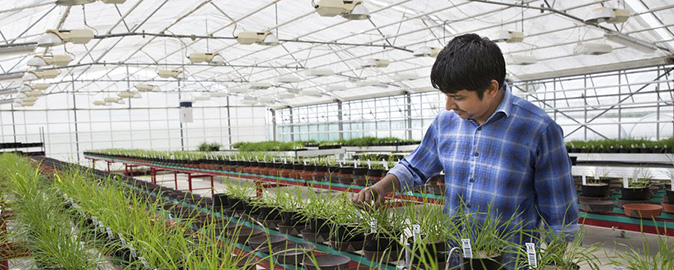SmartIPM

- Acronym: SmartIPM
- Title: Smart DSS for IPM in Protected Horticulture
- Countries involved: FR, ES, DE
- Total budget: € 487.600
Scientists aim to improve integrated pest management in greenhouses
Although the greenhouse environment is a controlled environment it nevertheless comprises a complex set of interactions between crops, pests and beneficials. Consequently, integrated pest management strategies have difficulty taking hold without an in-depth knowledge of these interactions.
A new European project involving scientists from four different research institutions in France, Spain and Germany will help solve this problem. The 2.5-year project, entitled SmartIPM, has a total budget of € 487.600. The aim of the project is to develop, optimise and validate decision support system tools in a real greenhouse cropping system context.
Consumers place high demands on horticultural crops, including greenhouse crops, and demand products that look good. Back in the greenhouse, the crops are subject to very high levels of pest risks. Farmers’ ambitions to meet the demands for high visual quality and low pest levels have led to an intensive use of pesticides and high indexes of frequency of treatment worldwide.
This chemical path is becoming unsustainable due to limits on the number of available active ingredients, an increase in pest resistance and concerns about health risks. For these reasons integrated pest management strategies, that tackle pest management using a wide variety of tools and techniques, should be the answer. However, a fundamental understanding of the functions of the agroecosystem at the local farm level appear to be more challenging than expected even in the controlled greenhouse environment.
The project partners intend to develop a robust integrated pest management strategy by designing accurate tools that enable monitoring and management of the spatiotemporal dynamics of all the key biotic components in a greenhouse environment. To this aim they will carry out the following tasks:
- Develop tools to assess the health status of crops via sampling and information analysis of the main biotic factors obtained from the monitoring of crops throughout European network of experimental stations and farms
- Promote the acquisition and implementation of the knowledge that is necessary for decision-making adapted to local specificities and constraints
- Build or optimise predictive models to anticipate pest and natural enemy dynamics in real cropping situations via systemic trials
- Develop decision support systems and tools relying on the re-definition of local, regional and European decision rules that also consider socio-economic aspects of farms
The system will be based on a decision support system already developed for ornamentals in France and Italy.
For more information about the project
please contact:
Dr. Christine Poncet
Institut National de la Recherche Agronomique
France
E-mail: christine.poncet@sophia.inra.fr